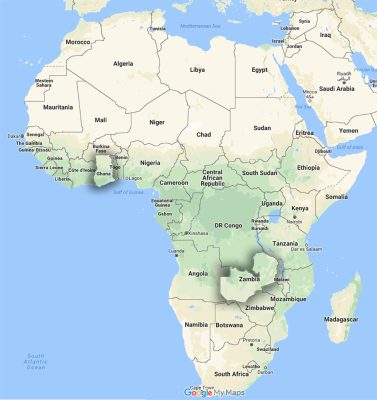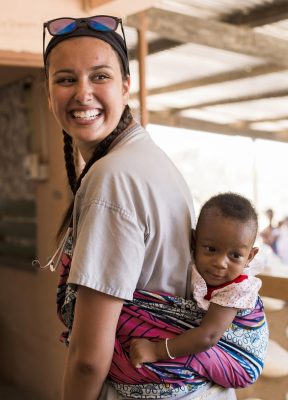
COMMITMENT, PASSION AND THE ABILITY TO THINK CRITICALLY AND CREATIVELY are attributes that describe the best health-care professionals—and these qualities are particularly important for those who want to practice global health.
For the past 15 years, UBC Okanagan undergraduate nursing students have been travelling to Africa during their fourth year of study. The Global Health practicum placement puts their skills and stamina to the test.
Global health prioritizes improving and achieving equity in health for all people worldwide. For those on the ground, it means working with communities, building on their capacities and working collaboratively with African colleagues to address health inequities.
Some thrive, others are challenged, and a few return to Africa because they develop a strong interest in the continent and its people.
All of them persevered to earn their citizenship in the global health community.
“Our students quickly recognize that there is strength and resiliency of the global communities with whom we work.” Jeanette Vinek, senior instructor at UBC Okanagan’s School of Nursing
Partner Countries: Ghana and Zambia
Almost 20 years ago, nurses from the Okanagan first ventured into Africa, when visionary Assoc. Prof. Joan Bassett-Smith was awarded a grant from the Canadian International Development Agency for the development of a Rural Nurse Practitioner Program (RNPP) in Northern Ghana. Soon thereafter, fellow enthusiast and UBC Okanagan nursing instructor Fay Karp and many others from the nursing faculty joined her.
In collaboration with Ghanaian nursing colleagues, the RNPP was designed to provide nurses with advanced knowledge and skills in community development and rural health issues, with particular emphasis on the health and well-being of women and children.
“I began to see how health care professionals from many backgrounds could collaborate to develop strategies to improve the education and well being of health care workers and their clients in limited resource settings and at home,” says Karp.
“All of our work is driven by our African partners who identify needs and areas where there is greatest demand.”
After her arrival in Ghana, Joyce Henderson, also a nursing instructor, realized that health care training could happen on both sides of the Atlantic. In 2001 Henderson accompanied the first group of fourth-year Okanagan nursing students to Ghana, to “see what would happen.” More than 17 years later, students from UBC Okanagan are still making the life-changing trek.
Based on the success of the Ghana initiative, a second partnership was established in Zambia. This was made possible thanks to the connections of Adjunct Professor Jessica Barker, who was working at the Lewanika School of Nursing in Zambia, and Karp’s eagerness to expand the practicum program.

“We have very strong relationships with our African community partners in Ghana and Zambia,” says Jeanette Vinek, UBC Okanagan senior nursing instructor and Global Health practicum coordinator.
Karp adds that the global health courses and practicum are based on the concepts of critical social theory and community development. These involve processes in which the community and partners come together to solve issues.
“The direction comes from our collaborative relationships with health care professionals in both countries,” says Karp. “All of our work is driven by their needs and areas where there is greatest demand.”
Barker deeply appreciates relationships she and her colleagues have built in Zambia over the last decade.
“I grow as much as the Zambian and Canadian nursing students do. Our work is mutually beneficial.”
Acute Care in Ghana
Vida Yakong welcomed 18 fourth-year students to her home country of Ghana in the spring of 2008.
 Yakong completed her PhD in Nursing Leadership at UBC Okanagan in 2013, then returned to Ghana to become the head of the Midwifery Department at the University for Development Studies (Ghana). Here she saw mutually beneficial opportunities for UBC Okanagan students, Ghanaian health professionals, Ghanaian nursing students and the communities in which she grew up.
Yakong completed her PhD in Nursing Leadership at UBC Okanagan in 2013, then returned to Ghana to become the head of the Midwifery Department at the University for Development Studies (Ghana). Here she saw mutually beneficial opportunities for UBC Okanagan students, Ghanaian health professionals, Ghanaian nursing students and the communities in which she grew up.
From health-care and spiritual practices to coping in crisis situations, both groups shared and learned new perspectives. Since then, more than a decade of nursing students have chosen this placement as part of their curriculum. For five and half weeks, they help deliver acute care and rotate through various community clinics.
Assisting a Ghanaian midwife to deliver preterm triplets, unsuccessfully resuscitating two, then losing the third was the experience of one UBC Okanagan nurse. For her, interacting with the young mothers who put their faith in the will of God, was a lesson in acceptance.
From burns and fractures, to malaria and other infectious disease treatment, the student nurses have had to think quickly on their feet, using resources that are inevitably limited.
“We came to this clinic as visitors looking to learn and expand our practice, however we did not anticipate this situation nor did we fully understand the proper processes and barriers that these rural clinics have to go through when presented with an acutely ill patient.” April 2017 Blog post, UBCO nurses in Ghana.
Alongside the Ghanian community, students have helped administer the first health-screening clinic in the northern village of Chanshegu; they have supported the birth of countless babies; discussed family planning; and assisted with the treatment of numerous injuries including broken limbs, snake bites and accidents.
Vinek adds that their focus has been unwavering and tightly focused on addressing the lack of primary health care in northern Ghana.
“We are in awe of how well this clinic serves the community with the little resources that they have.” April 2017 Blog post, UBCO nurses in Ghana
Opportunities in Zambia
In 2009, Karp accompanied the first cohort of fourth-year nursing students to Zambia. They were welcomed by UBC Okanagan graduate, Jessica Barker, who had already established ties with a Zambian nursing college.
Students had the opportunity to practice in a variety of tertiary, district level and primary health care settings, in addition to some rural outreach placements. Emphasis was also placed on opportunities for students to apply principles of leadership and advocacy, including teaching opportunities, continuing previous student projects and developing on-site practicum projects.
“We packed everything from eye glasses and water filters, to diapers and oxygen masks and tubing, to sterile surgical packages, IVs, catheters, syringes, textbooks, scrubs…and much more.” January 2010 Blog post, UBCO Nurses in Zambia
Students also have the opportunity to participate in research projects, partnering with the University of Zambia, the University of Barotseland and the Lewanika School of Nursing in Zambia. Blood pressure and cardiac dysfunctions have been the focus of this research.
“I came into this practicum expecting to change lives; not knowing how much they would actually change mine.” April 2016 Blog post UBCO Nurses in Zambia
Learn more about
Eyes Wide Open
Jessica Barker took a leap of faith the minute she signed on to be one of the very first UBC Okanagan nurses to travel to Africa for her fourth-year practicum. In her early 20s, Barker had never travelled outside North America, let alone embark on a trip to a far-away country. That was more than 10 years ago and since then Africa has become a second home to her.
“My family was a bit nervous about the trip, but I wanted to expand my horizons,” she says. “The experience changed my expectations and I came away with my eyes wide open about what the world has to offer and its health inequities.”
“The experience changed my expectations and I came away with my eyes wide open about what the world has to offer and its health inequities.”
The Africa experience went on to shape Barker’s future. After working in Canada for a year, she couldn’t wait to return. She completed her master’s degree in public health at the University of Cape Town. Then she went on to co-found the Okanagan Zambia Health Initiative (OkaZHI), whose aim is to build the capacity of Zambia’s health-care infrastructure and empower Zambian health care professionals to deliver the best health-care possible.
“I wanted to be a change agent,” she says.
Barker is grateful of the work she gets to do: “I grow as much as the students do. Each interaction is an opportunity to learn more—about yourself and about the community.”
The Faint of Heart Need Not Apply
Practicing in rural Africa is a paradox, according to Vinek.
“In one day, you will see the most beautiful thing and the next, witness incredible sorrow.”
The fourth-year practicum is mentally and physically challenging, from the extreme heat to the suffering of patients. Yet many students thrive in this environment—those are the ones who Vinek and her group are seeking.
“We look for those who are committed and have a passion for global health work, not an individual who thinks this ‘may be cool’.”
Barker agrees and suggests interested students make as many contacts as they can with the Canadian Global Health Community and get experience where they can.
“Take that leap of faith.”
Students who have gone to Ghana or Zambia say they have returned home more independent and confident, more aware of how health care systems can influence the health of a country, better critical and creative thinkers and fully aware about their own resiliency. They return with a sense of how fortunate they are to live in a health care system such as Canada’s and an awareness of the creativity and resiliency of their partners in Africa.
Things I will miss about Ghana…
- Wonderful, helpful people
- Sense of community
- Simplicity of the way of life
- Slower pace
- Lovely people
- People’s willingness to help
- Vivid colours that always surround you
- The heat!
Things I will NOT miss about Ghana…
- Unreliable power
- Sweat moustaches
- Power outages
- The heat!
—From the UBCO Nurses in Ghana blog